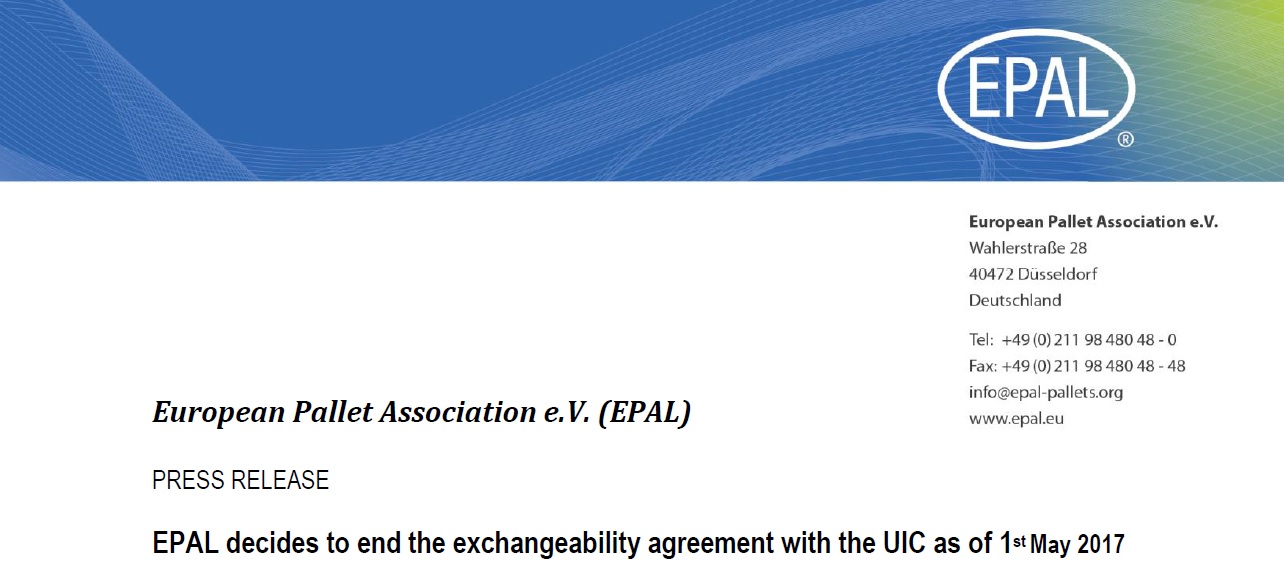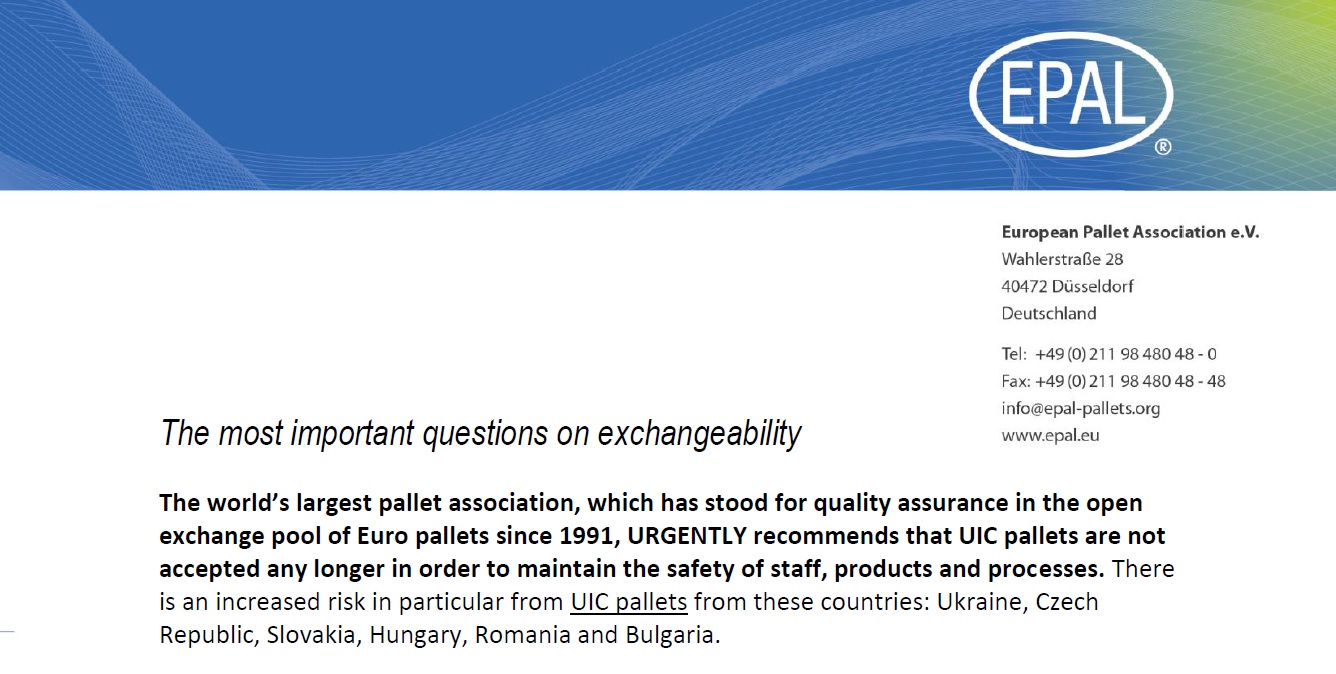
|
|
European Pallet Association e.V. (EPAL)
PRESS RELEASE
EPAL decides to end the exchangeability agreement with the UIC as of 1st May 2017.
The quality of the EPAL Euro pallet pool and the safety of employees, goods and logistics processes take top priority. For this reason, EPAL’s urgent recommended action is: To cease exchanging EPAL Euro pallets for UIC/EUR pallets.
Düsseldorf, 1st March 2017 – The Board of the European Pallet Association e.V. (EPAL) unanimously decided on 21st February 2017 to terminate the exchangeability agreement between EPAL and the Rail Cargo Austria AG (RCA) effective from 01/05/2017. In October 2014, EPAL agreed with RCA as the managing railway undertaking of the UIC Working Group, “Palletisation Issues”, that EPAL Euro pallets and UIC/EUR pallets could be exchanged with each other. EPAL now recommends that EPAL Euro pallets cease to be exchanged for UIC/EUR pallets. The EPAL Board substantiates this step with reference to the substantial shortcomings of UIC’s organisation of the exchange pool, including in the areas of quality assurance and fighting the import of counterfeit UIC/EUR pallets in the EU. To prevent difficulties for users, there will be an appropriate transitional period for exchanging UIC/EUR pallets which have been produced by the end of February 2017.
Martin Leibrandt, CEO of EPAL, warns, “EPAL can no longer guarantee that UIC/EUR pallets meet the demands that the industry, retail and logistics sectors justifiably place on the quality and safety of EPAL Euro pallets. In particular, the uncontrolled import of counterfeit UIC/EUR pallets endangers the quality and safety of the EPAL Euro pallet pool. According to research by EPAL, there are more than four million counterfeit UIC/EUR pallets from Ukraine on the market, and this number increases all the time. East European gangs for the main part are increasingly counterfeiting UIC/EUR pallets, since it has become riskier to counterfeit EPAL Euro pallets due to the joint action of EPAL, customs authorities and lawyers. EPAL assumes responsibility for the quality and safety of the EPAL Euro pallet pool. The industry, retail and logistics sectors can count on that.”
The organisation of the exchange pool and internationally consistent quality assurance is supported by EPAL alone.
Since the exchangeability agreement between EPAL and the UIC was concluded in October 2014, the UIC have taken no measures comparable to the activities undertaken by EPAL to protect the quality and safety of UIC/EUR pallets. In many countries, the UIC do not organise the exchange pool at all. Yet, in the two and a half years of negotiations, the UIC declined EPAL’s offer to take over the organisation of quality assurance and trademark protection for UIC/EUR pallets. In view of the negative consequences of the UIC’s conduct, EPAL no longer considers itself able to continue to recommend the exchange of EPAL Euro pallets with UIC/EUR pallets. Terminating the exchangeability agreement is in EPAL’s view the only option to effectively protect the quality and safety of the EPAL Euro pallet pool in the future.
To protect the safety of employees, goods and logistics processes, EPAL is recommending that in future, only EPAL Euro pallets are used and exchanged.
The recommendation to stop exchange between EPAL Euro pallets and UIC pallets applies from 01/05/2017. The previously effective recommendation that also pallets bearing the “EUR” marking (UIC, MAV, CD, ADIF, GreenCargo etc.) can be exchanged, to continue to apply, but however to be limited in duration until 31/12/2021 and restricted to pallets that have been produced by 28/02/2017 in strict compliance with the UIC leaflets 435-2 to 435-6.
Answers to frequently asked questions concerning this recommended action, can be found at: www.epal.eu.
About EPAL:
The European Pallet Association e.V. (EPAL) ensures a smooth flow of goods in the logistics world with over 450 million EPAL Euro pallets and 20 million box pallets in the world’s biggest open exchange pool. Founded in 1991 as the umbrella association of licensed producers and repairers of EPAL load carriers, EPAL is globally responsible for their consistent quality. EPAL pallets are produced from sustainably grown, CO2-neutral wood, can be repaired and recycled, and reduce transport distances thanks to their high level of availability. As a registered association, EPAL does not pursue any commercial interests and makes all its decisions in the interests of its industry, trade and logistics partners. EPAL is represented in more than thirty countries by fifteen National Committees which have committed themselves to implementing the EPAL objectives.
For further press information:
European Pallet Association e.V. (EPAL)
Andrea Engels
T +49 211 98 480 48 90
M +49 172 69 325 95
andrea.engels@epal-pallets.org
* * *
The most important questions on exchangeability
The world’s largest pallet association, which has stood for quality assurance in the open exchange pool of Euro pallets since 1991, URGENTLY recommends that UIC pallets are not accepted any longer in order to maintain the safety of staff, products and processes. There is an increased risk in particular from UIC pallets from these countries: Ukraine, Czech Republic, Slovakia, Hungary, Romania and Bulgaria.
The agreement on exchangeability with the UIC was terminated in February 2017 – with good reason.
QUALITY and SAFETY need structure and reliability. The international structure of EPAL, which has a presence in 20 countries with its National Committees and represents licensees in over 30 countries, inspecting all regularly, guarantees consistent SAFETY and QUALITY worldwide, which you need for your processes.
To avoid disruption to your processes and above all to keep them as simple as possible, we will try to answer your most important questions on pallet exchange. Please do not hesitate to contact us directly at any time, we are happy to help with your specific issues. Our colleagues at EPAL General Secretariat, your local National Committee and at the EPAL Academy are here for you!
Situation No 1: Pallet exchange
1. What do I need to consider in future when accepting pallets?
To make it nice and easy: When assessing pallets, focus on one single mark: .
Pallets bearing this marking in any position are considered exchangeable without limitation.
For assessing the suitability of pallets in terms of quality, the current standards and criteria naturally apply. You can find these in detail here:
http://www.epal-pallets.org/eu-en/load-carriers/product-downloads/
2. What about pallet exchange documentation?
There is no need for changes to the documentation. However, it might be helpful and worthwhile for you, if you separately list the UIC pallets on the corresponding pallet vouchers and deduct them, if you have determined this with your exchange partner.
3. How will ‘old’ exchangeability agreements be dealt with?
Concluded exchangeability agreements remain valid. Therefore, you might find that now is a good time to review your agreements to see what exactly they say. We also recommend that in future agreements, you consider stating that exchange is explicitly restricted to EPAL Euro pallets. Only by doing this can you be sure of receiving the quality that you need for your processes.
4. When does the revised exchangeability start?
The EPAL Board decided in February 2017 to terminate the agreement on exchangeability with the UIC. As for the reasons – which you might have guessed by the evident quality faults you see during your everyday work – you will find more detailed information about how to do this on the EPAL website: www.epal.eu.
The recommendation to stop exchange between EPAL Euro pallets and UIC pallets applies from 01/05/2017. The previously effective recommendation that also pallets bearing the “EUR” marking (UIC, MAV, CD, ADIF, GreenCargo etc.) can be exchanged, to continue to apply, but however to be limited in duration until 31/12/2021 and restricted to pallets that have been produced by 28/02/2017 in strict compliance with the UIC leaflets 435-2 to 435-6.
The definitive transitional period for each case will depend on the duration of the agreements which you have with your various partners. We would also recommend, updating exchangeability agreements as soon as possible, in order to avoid any problems in the future.
5. What should an agreement that protects against risk and disputes contain?
Clearly state in your agreements that you accept only EPAL Euro pallets as exchangeable pallets.If you have any specific queries, please don’t hesitate to contact us – we will be happy to help.
6. How does EPAL envisage the sorting and handling and any associated additional expenditure?
To be able to guarantee the process stability at your operation, you must systematically assess the pallets which are used. For assessments, we recommend considering a single additional criterion: the mark .
With immediate effect, only pallets bearing this mark are exchangeable. With respect to the additional criteria according to which you sort pallets and determine suitability for use in your activities, nothing will change. Defective is still defective, fit for purpose is still fit for purpose; that’s what EPAL quality assurance stands for.
Situation No 2: Ordering new pallets
1. How can I be certain of receiving original, exchangeable EPAL Euro pallets when reordering pallets?
A complete list of all approved producers and repairers, who are subject to EPAL’s quality assurance, can be found here:
http://www.epal-pallets.org/eu-en/licensee-search/
When ordering pallets make sure that the wording ‘exchangeable EPAL Euro pallets’ appears in the ordering process. This applies regardless of whether you are ordering new or used pallets.
2. For how long and which pallets may be supplied?
Existing orders and supply agreements remain effective during the agreed contractual term. For renegotiations and new orders, we recommend using the above suggested wording.


